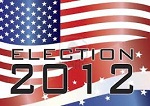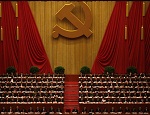

On 27th November 2012, distinguished personalities assembled at the VIF auditorium to attend its monthly series of talks by eminent persons, Vimarsha. This month’s Vimarsha talk was given by Amb. Prabhat P Shukla, former Ambassador to Russia, who is also the Joint Director of the VIF. Ambassador Shukla made a presentation on “Transition in America and China: Implications for India”. The session began with a brief introduction from Mr. Ajit Doval, KC, Director of the VIF on the topic.
Transition in the US

Ambassador Shukla then began with the US elections, assessing some important data and figures, to analyze the 2012 US Presidential Elections. On the voter turnout, Ambassador Shukla referred to the drop of 5% in the total votes cast in the 2012 elections from the 2008 elections, despite an increase of 8 million in the number of eligible voters. This drop in the number of votes cast was largely due to the failure of the Republicans in “energizing their base” sufficiently and perhaps one of the reasons for their loss. Considering the demographics of the elections, Ambassador Shukla said that Obama won the elections with a much wider margin among African-Americans, single women and Hispanics. But he emphasized that as much as it was Obama’s victory, it was the Republicans’ weakness that played a role too: Romney and Ryan both failed to win their home states, a most unusual feature in Presidential races. Comments made by Republicans, like “pregnancy from rape is something God intended” by Richard Mourdock or that on “legitimate rape” by Todd Akin, ensured that women voters were put off the Republican platform. Women happen to constitute 53% of the total voters in the 2012 elections. As far as the African-Americans and the Hispanics votes were concerned, there was a major sweep for the Democrats, as they won over 90% and 70% of their votes, respectively. Here, again, Ambassador Shukla mentioned the failure of the Republicans in generating their appeal among these races. He asserted that, had the Republicans appointed Condoleezza Rice, for example, as the Vice-Presidential candidate, it would have enhanced the party’s image among women and the African-American voters.
Being the first US President since the Second World War to be re-elected with a lower margin in the Electoral College, Obama and the Democrats have not quite overcome what Obama called the “Shellacking” of 2010. Ambassador Shukla ended the first part of the presentation with a brief mention of Tulsi Gabbard, who will be the first Hindu to be elected to the US House of Representatives [from Hawaii] and will take her oath on the Bhagavad-Gita.
Transition in China

The second part of the presentation studied the main events of the 18th National Congress of the Communist Party of China (CPC). The 18th National Congress’ PBSC include Xi Jinping, Li Keqiang, Zhang Dejiang, Yu Zhengsheng, Liu Yunshan, Wang Quishan, and Zhang Gaoli in that order of ranking. Ambassador Shukla described, in brief, their party positions and their likely state positions (to be finalized in March 2013 at the National Peoples’ Congress).
Assessing Hu Jintao’s position in the CPC, Ambassador Shukla highlighted the setbacks which Hu Jintao had recently faced. He pointed out that Hu Jintao had to vacate the post of the head of the Central Military Commission (CMC) and that Hu Jintao’s closest aide, Ling Jihua, was removed as the head of the general department of the CPC on the eve of the Congress, which was quite unusual. In making Ling Jihua the head of the United Front Work Department that deals with the Dalai Lama, nonetheless, Hu had placed a trusted aide to deal with an issue that he attaches importance to.The same goes for the 49-year old Hu Chunhua, who is the youngest member of the Politburo, and a likely sixth-generation leader in 2022. Hu Chunhua has served in Tibet for twenty years, speaks Tibetan and has been groomed by Hu Jintao to maintain, inter alia, a hard line on Tibet.
Ambassador Shukla also examined Hu Jintao’s important references to the corruption issue, the need to restructure the economy, the need to “win a local war in an information age”, as among the highlights of the Work Report. He also touched upon the reference to Consultative Democracy, a first in such a setting. Summing up the second part, Ambassador Shukla made an important remark that, even though the domestic political system has recently been declared a core issue, the social situation in China is precarious with over 180,000 reported incidents of major unrest in 2011 alone, asserting that “change is an ineluctable necessity”.
Implications for India

In the final section of the presentation, Ambassador Shukla assessed the likely security, economic and political implications of these transitions on India. Beginning the section with study of the various economic dynamics in Asia, Ambassador Shukla tabulated the FDI figures and the direction of Merchandise Trade to highlight the important role played by the US in the economic success of China. The figures from 1995 to 2007 showed a remarkable increase in FDI in China and increasing exports from China into Europe and North America. Drawing parallels with the model of growth in Europe and then in Japan, he said that this FDI and export-based model of economic growth shows a remarkable increase at the beginning but later the growth rate subdues, as happened with Europe and Japan. The Chinese model of economic growth too has reached its limits. This is why Hu Jintao himself described the model as “unbalanced, uncoordinated, and unsustainable”.
The next argument that Ambassador Shukla dealt with was that that the US is heavily dependent on China economically. Disagreeing with this notion, he highlighted firstly that, while the holdings of the US national debt by Japan, Persian Gulf oil exporters and India has increased since 2011, the share of the US national debt held by China has dropped from $ 1.3 trillion to $ 1.1trillion. This adds up to just 6.85% of the US GDP.
In discussing the power play in the Asia-Pacific region, the speaker touched upon the expectations of a number of India’s partners for India to play a greater role in the security of the region, particularly in the western Pacific. Ambassador Shukla argued that India would be justified in demanding reciprocal support from the US and the Asian allies on its security concerns vis-à-vis China and Pakistan. Afghanistan, as the Ambassador asserted, is going to be the next hotspot as the date for the withdrawal of the ISAF is nearing. China is likely to engage, as it has in the past, with the Taliban to try and humiliate the US as it plans to withdraw its troops.
In summing up, the speaker said that, with China, India has a serious unresolved border dispute, on which China has, till date, not shown any serious intent to move forward. On the other hand, with America, India has just one real conflict of interest, that being Pakistan. The US has the potential of being one of India’s major strategic partners in the long run. This alone would call into question the validity of the doctrine of non-alignment being pressed by some in the face of the emergence of China. Ambassador Shukla suggested that the challenge for the Indian and the US governments is to develop a new platform for cooperation, which would address their differences and enable them to identify long-range plans for working together.
At the same time, Ambassador Shukla reminded the audience of the importance of relations with Russia, France, Japan and Israel. Ambassador Shukla said that India holds a unique position of being in a position to bridge the gap between the US and Russia, as both the nations are equally important for us. Also mentioned was the importance of Iran for India, especially in the context of Afghanistan and India’s role in its future stability.
The entire presentation can be accessed by clicking here. [2]
Links:
[1] https://www.vifindia.org/event/report/2012/12/07/vimarsha-on-transition-in-american-and-china-implications-for-india
[2] http://www.vifindia.org/transcriptions-paper/2012/12/07/vimarsha-on-transition-in-american-and-china-implications-for-india
[3] http://www.facebook.com/sharer.php?title=Vimarsha on “Transition in America and China: Implications for India” with Amb. Prabhat P Shukla, former Ambassador to Russia&desc=&images=https://www.vifindia.org/sites/default/files/DSC_1492.JPG&u=https://www.vifindia.org/event/report/2012/12/07/vimarsha-on-transition-in-american-and-china-implications-for-india
[4] http://twitter.com/share?text=Vimarsha on “Transition in America and China: Implications for India” with Amb. Prabhat P Shukla, former Ambassador to Russia&url=https://www.vifindia.org/event/report/2012/12/07/vimarsha-on-transition-in-american-and-china-implications-for-india&via=Azure Power
[5] whatsapp://send?text=https://www.vifindia.org/event/report/2012/12/07/vimarsha-on-transition-in-american-and-china-implications-for-india